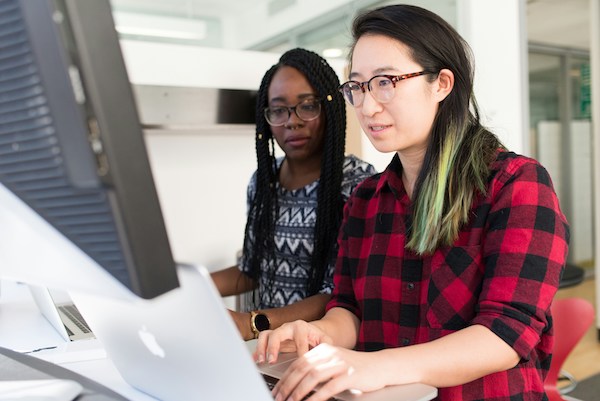In an era where technology drives innovation and opportunity, ensuring that marginalized communities have equitable access is crucial. Organizations dedicated to making tech more accessible to BIPOC (Black, Indigenous, and People of Color) and LGBTQ+ individuals are at the forefront of this transformative work, addressing systemic barriers and fostering inclusivity in the tech industry. Here’s a closer look at six key players in this vital movement.
-
Code2040
Code2040 is a prominent nonprofit focused on increasing the representation of Black and Latinx individuals in the tech industry. Their programs include fellowships, internships, and a network that connects tech talent with leading companies. By providing mentorship, professional development, and community support, Code2040 dismantles barriers and creates pathways for success in tech for marginalized communities.
Code2040 was founded by Laura Weidman Powers and Tristan Walker. Powers is a prominent figure in the technology and entrepreneurship sectors, known for her dedication to social justice and technology accessibility. Before her work with Code2040, Powers held leadership positions in various organizations focused on promoting diversity and inclusion in technology and entrepreneurship.
Walker is the founder of Walker & Company. He created Bevel, a men’s grooming brand, under Walker & Company to address grooming needs for people of color. Walker has also made significant contributions as an investor and advisor in tech and entrepreneurship.
Code2040 exists to ensure that technology is not only created with Black and Latinx communities in mind, but created by Black and Latinx people. “Change is hard and change is slow. But I think we’re on the right track,” says Powers.
-
Lesbians Who Tech
Lesbians Who Tech is a vibrant community that supports LGBTQ+ women and non-binary individuals in the tech sector. This organization hosts conferences, networking events, and mentorship programs designed to amplify the voices of LGBTQ+ tech professionals. By fostering an inclusive environment, Lesbians Who Tech helps members build connections, gain visibility, and advance in their careers.
Leanne Pittsford founded Lesbians Who Tech because LGBTQ+ women and nonbinary leaders are rarely centered, resulting in their voices being missed in leadership. Pittsford has a notable background in digital marketing and technology, and previously held positions in various tech and startup companies, where she contributed to their growth and outreach efforts. Additionally, Pittsford has long been an advocate for LGBTQ+ rights and gender diversity in tech through her consulting work and public speaking engagements.
Increasing representation in technology is no small feat. “Take more risks. Life is about making choices. Say yes and figure out the details later. Saying yes when you think you can’t is exactly when you should,” said Pittsford.
-
Black Girls Code
Black Girls Code inspiring and prepares young Black girls for futures in tech and computer science. Through workshops, coding camps, and hackathons, the organization provides hands-on experience and educational resources. Their mission is to close the technology gap by empowering young Black girls with the skills and confidence needed to pursue tech careers.
Kimberly Bryant, a distinguished American electrical engineer with a rich background in biotechnology at leading firms like Genentech, Novartis Vaccines, Diagnostics, and Merck, founded Black Girls Code in 2011. She passionately states, “Women and girls are naturally agents of change. If we teach one girl to code, she will go on to teach more—this is evident from our programs and workshops across the country.”
-
TransTech Social Enterprises
TransTech Social Enterprises provides technology training and job opportunities to transgender individuals. Their programs include workshops, career coaching, and an online platform connecting trans tech professionals with job opportunities. By addressing the specific challenges faced by the trans community, TransTech aims to create a more inclusive and supportive tech ecosystem.
Angelica Ross, a transgender woman and self-taught coder, web developer, and advocate, also starred in FX TV shows Pose and American Horror Story. Ross reflects, “I discovered my path to independence through technology and saw its potential as a global lifeline for trans people seeking the same.” Her goal with TransTech Social is to provide others in the trans community the same independence.
-
The Digital Divide Initiative
The Digital Divide Initiative works to bridge the technology gap for underserved communities, including BIPOC and LGBTQ+ individuals. As an initiative led by the big four accounting firm Ernst & Young (EY), they focus on increasing digital literacy, providing access to technology, and supporting tech education. They are devoted to empowering underserved communities through strategic partnerships that provide essential devices, internet access, and mentorship.
-
Out in Tech
Out in Tech is an organization that unites LGBTQ+ tech professionals to drive positive change in the industry. They provide a Slack community for LGBTQ+ individuals to network and exchange information, volunteer with LGBTQ+ organizations, and use their skills to actively support the community. Out in Tech emphasizes the importance of representation and community in tech.
These organizations play a critical role in addressing the disparities in tech accessibility faced by BIPOC and LGBTQ+ communities. By providing resources, support, and advocacy, they are helping to build a more inclusive tech landscape where diverse voices can thrive. As technology continues to evolve, these efforts are essential in ensuring that everyone, regardless of background, has the opportunity to contribute to and benefit from the digital world.



